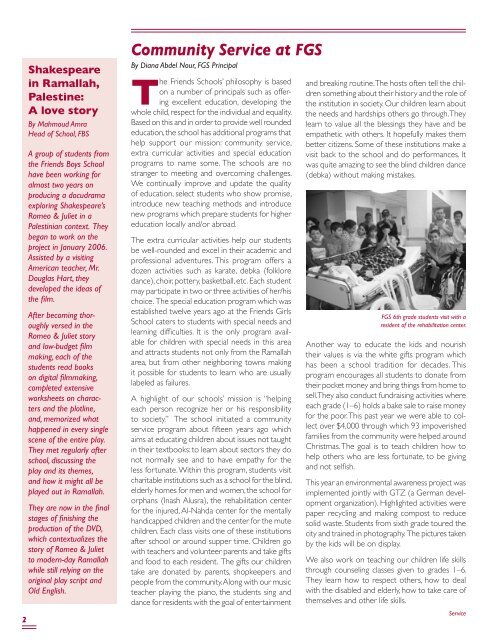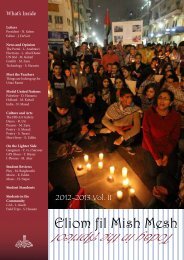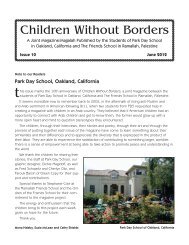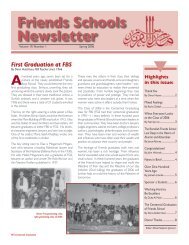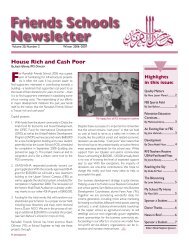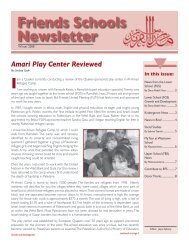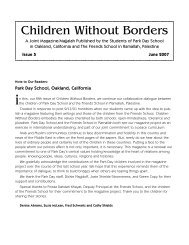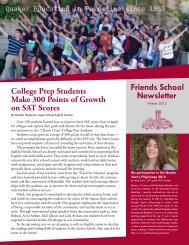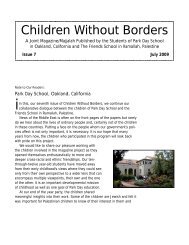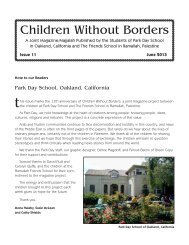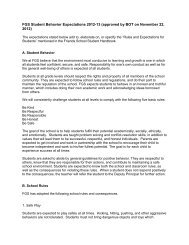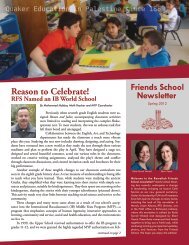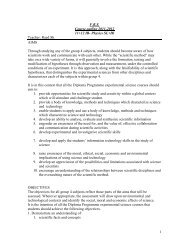A Quaker Auditor? - Ramallah Friends Schools
A Quaker Auditor? - Ramallah Friends Schools
A Quaker Auditor? - Ramallah Friends Schools
Create successful ePaper yourself
Turn your PDF publications into a flip-book with our unique Google optimized e-Paper software.
2<br />
Shakespeare<br />
in <strong>Ramallah</strong>,<br />
Palestine:<br />
A love story<br />
By Mahmoud Amra<br />
Head of School, FBS<br />
A group of students from<br />
the <strong>Friends</strong> Boys School<br />
have been working for<br />
almost two years on<br />
producing a docudrama<br />
exploring Shakespeare’s<br />
Romeo & Juliet in a<br />
Palestinian context. They<br />
began to work on the<br />
project in January 2006.<br />
Assisted by a visiting<br />
American teacher, Mr.<br />
Douglas Hart, they<br />
developed the ideas of<br />
the film.<br />
After becoming thoroughly<br />
versed in the<br />
Romeo & Juliet story<br />
and low-budget film<br />
making, each of the<br />
students read books<br />
on digital filmmaking,<br />
completed extensive<br />
worksheets on characters<br />
and the plotline,<br />
and, memorized what<br />
happened in every single<br />
scene of the entire play.<br />
They met regularly after<br />
school, discussing the<br />
play and its themes,<br />
and how it might all be<br />
played out in <strong>Ramallah</strong>.<br />
They are now in the final<br />
stages of finishing the<br />
production of the DVD,<br />
which contextualizes the<br />
story of Romeo & Juliet<br />
to modern-day <strong>Ramallah</strong><br />
while still relying on the<br />
original play script and<br />
Old English.<br />
Community Service at FGS<br />
By Diana Abdel Nour, FGS Principal<br />
The <strong>Friends</strong> <strong>Schools</strong>’ philosophy is based<br />
on a number of principals such as offering<br />
excellent education, developing the<br />
whole child, respect for the individual and equality.<br />
Based on this and in order to provide well rounded<br />
education, the school has additional programs that<br />
help support our mission: community service,<br />
extra curricular activities and special education<br />
programs to name some. The schools are no<br />
stranger to meeting and overcoming challenges.<br />
We continually improve and update the quality<br />
of education, select students who show promise,<br />
introduce new teaching methods and introduce<br />
new programs which prepare students for higher<br />
education locally and/or abroad.<br />
The extra curricular activities help our students<br />
be well-rounded and excel in their academic and<br />
professional adventures. This program offers a<br />
dozen activities such as karate, debka (folklore<br />
dance), choir, pottery, basketball, etc. Each student<br />
may participate in two or three activities of her/his<br />
choice. The special education program which was<br />
established twelve years ago at the <strong>Friends</strong> Girls<br />
School caters to students with special needs and<br />
learning difficulties. It is the only program available<br />
for children with special needs in this area<br />
and attracts students not only from the <strong>Ramallah</strong><br />
area, but from other neighboring towns making<br />
it possible for students to learn who are usually<br />
labeled as failures.<br />
A highlight of our schools’ mission is “helping<br />
each person recognize her or his responsibility<br />
to society.” The school initiated a community<br />
service program about fifteen years ago which<br />
aims at educating children about issues not taught<br />
in their textbooks: to learn about sectors they do<br />
not normally see and to have empathy for the<br />
less fortunate. Within this program, students visit<br />
charitable institutions such as a school for the blind,<br />
elderly homes for men and women, the school for<br />
orphans (Inash Alusra), the rehabilitation center<br />
for the injured, Al-Nahda center for the mentally<br />
handicapped children and the center for the mute<br />
children. Each class visits one of these institutions<br />
after school or around supper time. Children go<br />
with teachers and volunteer parents and take gifts<br />
and food to each resident. The gifts our children<br />
take are donated by parents, shopkeepers and<br />
people from the community. Along with our music<br />
teacher playing the piano, the students sing and<br />
dance for residents with the goal of entertainment<br />
and breaking routine. The hosts often tell the children<br />
something about their history and the role of<br />
the institution in society. Our children learn about<br />
the needs and hardships others go through. They<br />
learn to value all the blessings they have and be<br />
empathetic with others. It hopefully makes them<br />
better citizens. Some of these institutions make a<br />
visit back to the school and do performances. It<br />
was quite amazing to see the blind children dance<br />
(debka) without making mistakes.<br />
FGS 6th grade students visit with a<br />
resident of the rehabilitation center.<br />
Another way to educate the kids and nourish<br />
their values is via the white gifts program which<br />
has been a school tradition for decades. This<br />
program encourages all students to donate from<br />
their pocket money and bring things from home to<br />
sell. They also conduct fundraising activities where<br />
each grade (1–6) holds a bake sale to raise money<br />
for the poor. This past year we were able to collect<br />
over $4,000 through which 93 impoverished<br />
families from the community were helped around<br />
Christmas. The goal is to teach children how to<br />
help others who are less fortunate, to be giving<br />
and not selfish.<br />
This year an environmental awareness project was<br />
implemented jointly with GTZ (a German development<br />
organization). Highlighted activities were<br />
paper recycling and making compost to reduce<br />
solid waste. Students from sixth grade toured the<br />
city and trained in photography. The pictures taken<br />
by the kids will be on display.<br />
We also work on teaching our children life skills<br />
through counseling classes given to grades 1–6.<br />
They learn how to respect others, how to deal<br />
with the disabled and elderly, how to take care of<br />
themselves and other life skills.<br />
Service


